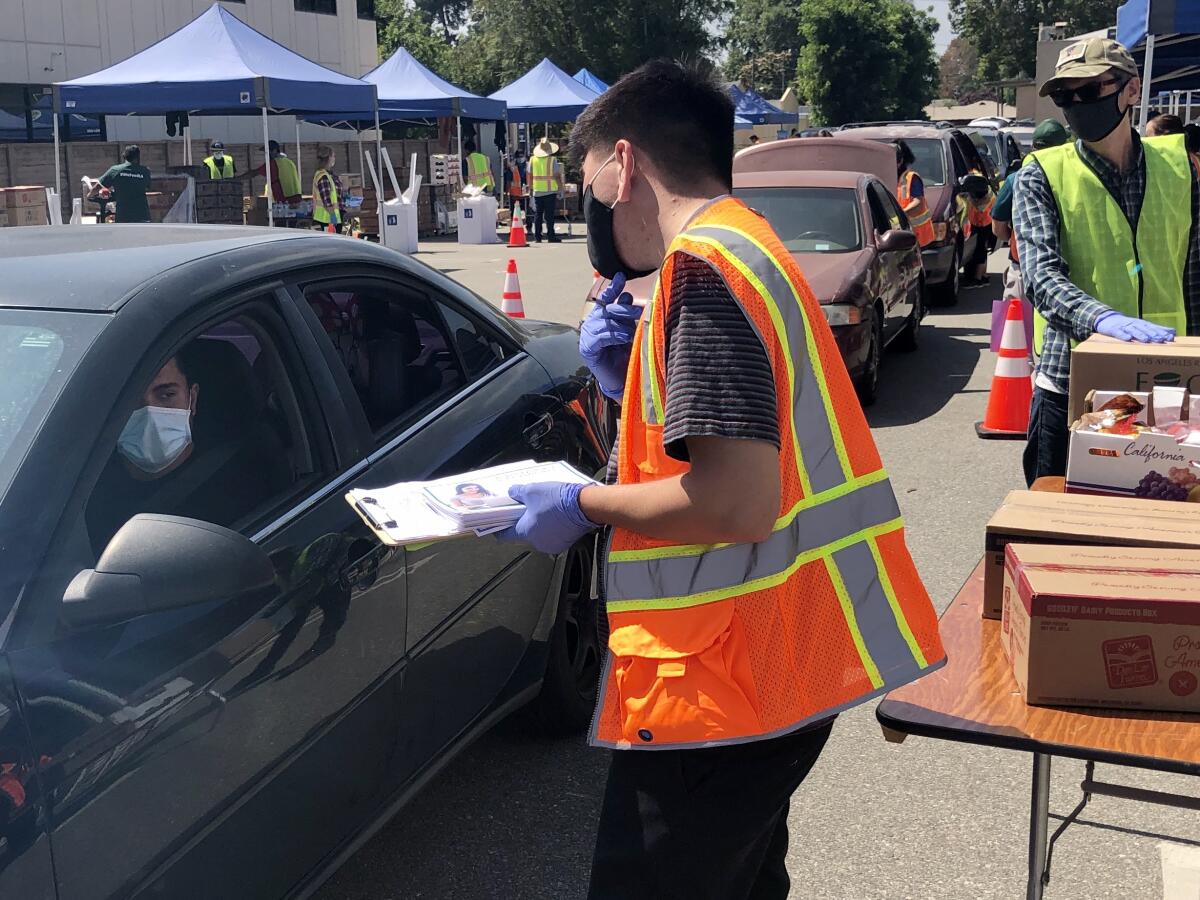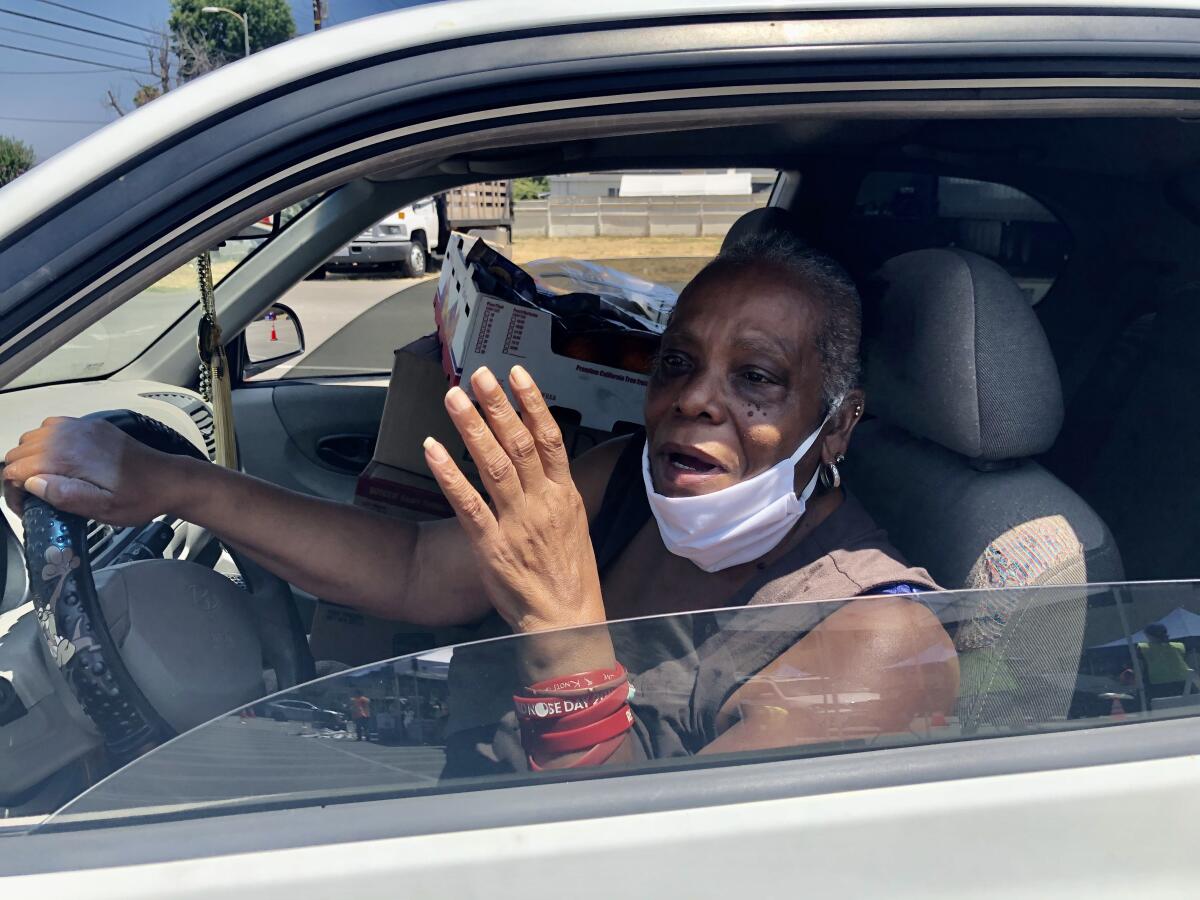Out of work, desperate and hungry, they waited in long lines for food

- Share via
Jeanette Allen waited and waited in a line of cars that stretched down Haskell Avenue and east on Parthenia Street all the way under the 405, and when she finally pulled up to the food distribution tent in North Hills on Thursday, a worker asked her to pop the trunk.
“The trunk doesn’t open,” said Allen, who was driving an 18-year-old white Hyundai sedan.
“You want us to just hand it to you through the window?” she was asked.
Four boxes of fresh produce, dairy products and cupboard items were handed to Allen and she stacked them on the passenger seat. Allen told me she had been getting by on a Social Security disability check and her income as a nanny. But then the child’s mother lost her job because of the economic crash and didn’t need the help any longer.

“I miss her so much,” Allen said of the child she took care of. “I love my baby.”
Allen said she and two sisters share a Van Nuys apartment on a tight budget, and this was the fourth or fifth time she had lined up for food giveaways since the pandemic knocked everything off course. “I mean, when I pay my bills, I am broke,” said Allen. “I’ve got about $2 with me right now, and it’s in change.”
Los Angeles Regional Food Bank director Michael Flood said his nonprofit’s food distribution totals are up 70% over this time last year. The equivalent of 27.5 million meals have been handed out since March, and while it feels rewarding to offer the assistance, Flood said, “It’s heartbreaking to have a long line of cars and see how many people are struggling to feed their families.”
On Thursday, the food bank brought enough food to donate to 1,500 families who drove to New Horizons, a nonprofit that serves people with special needs. The day before, 2,400 families were served in Whittier.
The numbers reflect our failure to handle the virus as well as countries that were more vigilant about common sense distancing and mask wearing. Here, we’re dubious, defiant and selfish, with far too many people taking their lead from a president who pushed for a quick reopening that is now crushing rather than boosting the economy.
But there’s plenty of blame to go around. California still hasn’t figured out coherent strategies for testing and tracing, and residents are understandably confused by conflicting and changing messages from Gov. Gavin Newsom and others about what we can and can’t do.
So instead of enjoying some freedom on Fourth of July weekend, beaches and restaurants are closed because California has seen an alarming surge in new cases and hospitalizations. We’re a pandemic hot spot state, not all that much better off than Arizona, Texas and Georgia, which rushed to reopen.
And the casualties are in their vehicles, idling with family members including children in baby seats, desperate for enough food to hold them over a little longer.
“We got in the wrong line at first,” said Larry Latham, who arrived at 9 a.m. with his wife Sittit and saw so many vehicles ahead of him, he got confused about where he was supposed to queue up.
They finally got to the front of the line at 11:15. Larry, an unemployed film lab technician, said he’s been on disability and was finally nearing a return to work when the economy went bust. Sittit is a home health aide who is averaging only two days of work per week.
Mahdi Tavazoei, an out of work mechanical engineer, picked up some food along with his wife, Nahid, a nursing student. He said he had been driving for Uber, but has given that up for now.
“I’m afraid of the virus,” he said, telling me that he and his wife were surviving on their savings. “I have no job, and I am counting every dollar.”
Meg Arakelians, one of the workers on the food line, is an L.A. County library aide whose library is closed due to the virus. She and some colleagues are occasionally reassigned to help out with these giveaways.
Arakelians was one of several workers who would get their own food handout at the end of their shift. She told me she lives with her sister and parents, and two of the four of them are out of work.
“So this food donation will really help you out?” I asked.
She told me the food wasn’t for her family; she was going to deliver it to some friends.
“They lost their jobs and they have two kids,” Arakelians said, “so they could really use the help.”
Volunteers, some of whom work year round, help make the L.A. Regional Food Bank the great nonprofit that it is. My wife did a one-day shift at a food giveaway in Highland Park several weeks ago and told me about a young Cal State Fullerton graduate she teamed with, Alexis Jaime, who told her he planned to work about 50 volunteer shifts while waiting to hear back on his graduate school applications.
“I think I’ve done more than 30 since the beginning of March,” Jaime told me when I called to ask him how things were going. He said that Spanish-speaking families have opened up to him on the drive-through food lines about their financial struggles during the pandemic. They’ve lost jobs, lost hours, and lost the economic footing they were barely able to keep even before the economy tumbled.
“This one lady was crying, saying she lost her job and was having a really tough time,” said Jaime, who has wanted to be a doctor since he was about 10 and his grandfather died after intestinal surgery. His other grandfather now has COVID-19, Jaime said, and when there’s food left over after the giveaways, he’ll take boxes to relatives and friends so they don’t have to risk going to the store.
At Thursday’s giveaway, I found three people who were there volunteering because they had time on their hands after losing jobs.
Allie Rosen, just out of college, lost his job as a technician at Six Flags Magic Mountain. He said he first got interested in public service in high school, and the food line seemed like a good way to lend a hand.
James Rickman, who lost his job as a magazine editor, said he has volunteered at several food giveaways. It’s partly because he wants to be of use, he said. And also “to help deal with this feeling of despair.”
A.J. Norris told me he lost a small sales business and is doing occasional yard work. With extra time on his hands he wanted to “do something to serve the community.” When I asked why, he said, “Because a lot of people are struggling.”
The long line of snaking cars confirmed his assessment.
More to Read
Sign up for Essential California
The most important California stories and recommendations in your inbox every morning.
You may occasionally receive promotional content from the Los Angeles Times.














